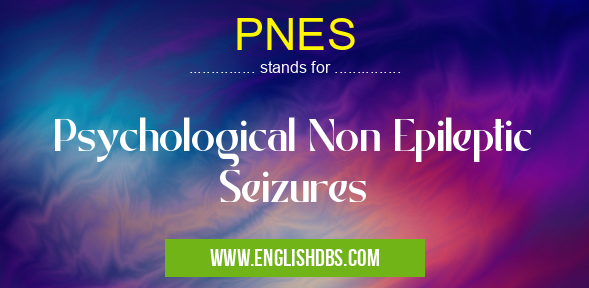What does PNES mean in DISEASES
Psychological Non Epileptic Seizures, or PNES, are a set of involuntary physical and mental symptoms that have no identifiable neurological cause or physiological basis. It is commonly believed that PNES is caused by trauma, stress, or psychological distress. While some people may experience one seizure episode, others can suffer from recurrent episodes over an extended period of time. Understanding the meaning behind the acronym PNES can help provide clarity on this condition and allow individuals to take all necessary steps in seeking appropriate care and support.

PNES meaning in Diseases in Medical
PNES mostly used in an acronym Diseases in Category Medical that means Psychological Non Epileptic Seizures
Shorthand: PNES,
Full Form: Psychological Non Epileptic Seizures
For more information of "Psychological Non Epileptic Seizures", see the section below.
Definition
PNES stands for Psychological Non Epileptic Seizures. This refers to a group of physical and mental symptoms that are not typically associated with a medical cause, like epilepsy. Instead, these seizures most often occur in response to emotional distress or life stresses such as trauma, loss of loved ones or traumatic events. They can be experienced either as isolated episodes or recurrent episodes that may last for days, weeks or even months at a time. Since they don’t have any identifiable neurological causes, diagnosis is usually based on observation over an extended period of time.
Symptoms
The most common symptom associated with PNES is an altered state of consciousness as well as physical convulsions similar to those seen during an epileptic seizure. Other symptoms may include intense fear and feelings of detachment, confusion and memory problems following the episode, difficulty communicating verbally or comprehending language after the episode passes and changes in behavior after the event has passed. In addition to these primary symptoms there can also be autonomic nervous system issues like changes in breathing rate and heart rate during the episode.
Diagnosis
Since PNES does not have any identifiable neurological causes it is often difficult to diagnose accurately. Health professionals will typically rule out potential medical conditions through comprehensive assessment which includes observations of behaviour before, during and after an event occurs as well providing information about other aspects including family history and lifestyle factors that may contribute to episodes occurring. In some cases laboratory tests such as EEGs might also be used if results are inconclusive. An accurate diagnosis is essential for getting targeted treatment so health professionals will usually try different approaches when assessing patients experiencing possible PNES before making a diagnosis.
Treatment
Treatment options for individuals suffering from PNES will typically involve psychotherapy tailored towards their individual needs combined with medications in order to produce beneficial results quickly while reducing severity of seizures over a longer period of time.Due to its psychological root cause it is important for patients focus on treating both body and mind in order reduce frequency and severity if seizures with therapies such as cognitive behavioural therapy being commonly used.In some cases hospitalisation might be required depending on individual circumstances but this should always be discussed first with health professional caring for patient.
Essential Questions and Answers on Psychological Non Epileptic Seizures in "MEDICAL»DISEASES"
What are Psychological Non Epileptic Seizures?
Psychological Non Epileptic Seizures (PNES) are sessions of intense physical shaking and movements which mimic epilepsy but can be caused by psychological or emotional issues rather than electrical misfiring within the brain.
How do I know if I am having a PNES attack?
If you experience an episode of extreme physical shaking, movements or sensations that seem to have no physical cause, then this could be a PNES attack. It is often difficult to differentiate between PNES attacks and epileptic seizures so seeking professional advice is recommended.
What are the symptoms of PNES?
Symptoms of PNES vary from person to person, however some common reports include feeling faint and dizzy, temporary paralysis, violent shaking, jerking movements, suffocation and confusion.
Can PNES be controlled?
Yes. With proper medical treatment and lifestyle adjustments such as therapy, medication or relaxation techniques, many people can effectively manage their condition.
Are there any potential risks of having a PNES attack?
Yes. People who suffer from PNES may also suffer from depression or anxiety which can lead to further complications if not treated properly such as self-harming behavior or suicidal thoughts. Seeking professional help is important in order to treat any underlying issues that may contribute to the disorder.
Who is most likely to develop PNES?
Although anyone can develop this condition it tends to affect more female than male individuals. Individuals with mental health conditions such as depression, bipolar disorder or PTSD are more prone than others, however age group does not appear to matter when it comes to developing this condition.
What kind of treatment is available for people with Psychological Non Epileptic Seizures?
Treatment for PNES typically consists of psychotherapy including cognitive behavioral therapy (CBT) which helps patients identify and manage their stressors; medication management; relaxation techniques such as yoga and meditation; diet modifications; sleep hygiene; vocational support; and family education/support depending on individual needs.
Final Words:
PNES stands for Psychological Non-Epileptic Seizures which refers to a set of physical and mental symptoms related to emotional distress such as trauma,stress or grief instead neurological causes like epilepsy.Symptoms include altered states of consciousness along with convulsive movements,changes in behavior post-episode,communication difficulties amongst others.Diagnosis usually involves ruling out potential medical conditions while treatment involves combining psychotherapy tailored towards individual needs along with medications while trying different approaches when assessing patients.
